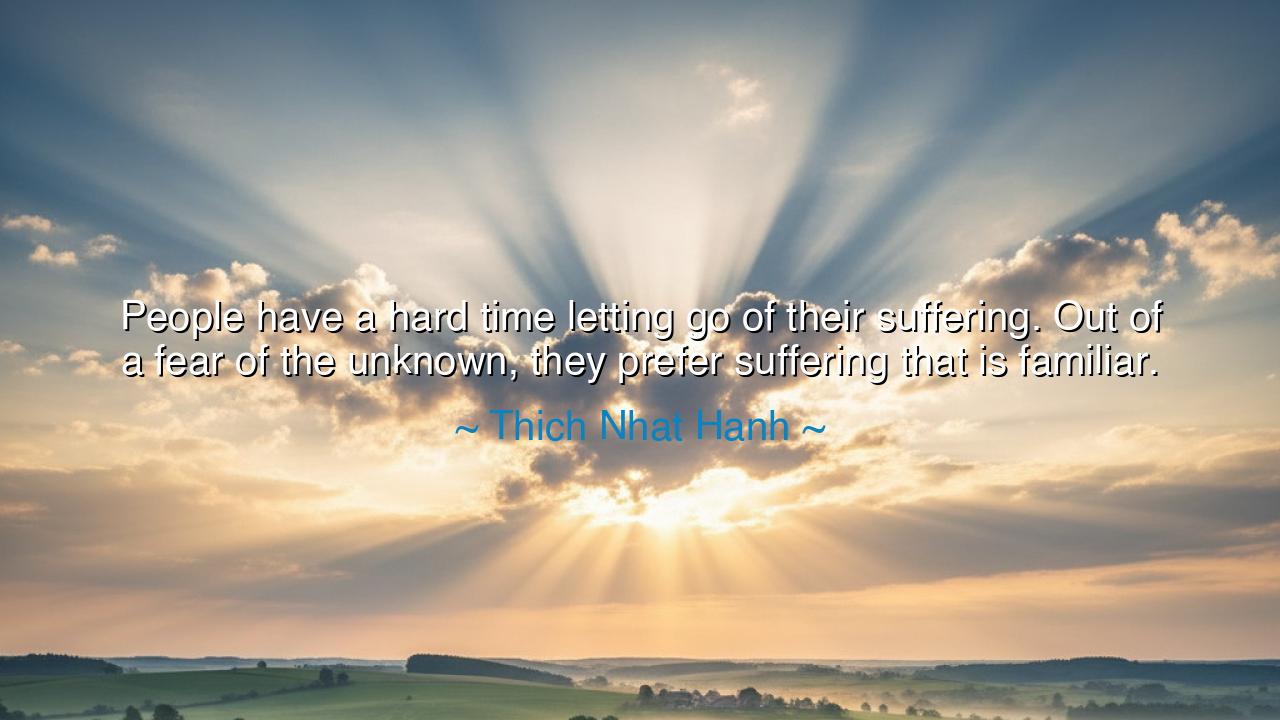
People have a hard time letting go of their suffering. Out of a
People have a hard time letting go of their suffering. Out of a fear of the unknown, they prefer suffering that is familiar.






Hear the gentle yet piercing wisdom of Thich Nhat Hanh, the monk of mindfulness, who spoke: “People have a hard time letting go of their suffering. Out of a fear of the unknown, they prefer suffering that is familiar.” These words strike at the heart of human weakness, for they reveal the strange bondage we forge for ourselves. Though the chains of sorrow cut into our flesh, many choose to keep them, because beyond them lies uncertainty. The mind clings to what is painful, because it is known, and trembles before what is uncertain, though it may hold freedom.
The ancients also understood this paradox of the soul. Did not Plato tell of the prisoners in the cave, who sat chained, staring at shadows on the wall? When one was freed and led toward the light, the others resisted, preferring the suffering of shadows to the dazzling radiance of truth. So it is with us: the familiar, even if bitter, often feels safer than the unfamiliar, even if it promises healing.
Consider the story of enslaved peoples who, once given freedom, faced a terrifying horizon. Though they longed for liberation, many still felt the pull of what was known, even in bondage. This is not weakness, but the cruel design of suffering—to bind not only the body but the mind. To step into the unknown required immense courage, for it meant embracing a life beyond the patterns they had come to know. True liberation is not only a breaking of chains, but a surrendering of the comfort of familiarity.
In the life of Thich Nhat Hanh himself, exile was a teacher. Banished from his homeland for his stance of peace during the Vietnam War, he walked into the unknown, carrying with him only his breath and his practice. Many would have clung to the pain of loss, repeating bitterness endlessly. But he chose instead to let go of familiar grief and step into the uncertainty of new lands, where he sowed the seeds of mindfulness across the world. His teaching arose not from theory, but from lived endurance of the truth he spoke.
But hear this warning, O children of the present: clinging to suffering will never heal you. If you hold your wounds as treasures, they will fester. If you worship your pain because it is familiar, you will never see what lies beyond. The fear of the unknown is a shadow that keeps countless souls from transformation. Yet the unknown is not always a storm—it can be a dawn.
The lesson is clear: to be free, you must let go. It is not enough to wish for change while clutching still to the chains of yesterday. Release the sorrow you know, and step into the path you do not yet see. For beyond the veil of uncertainty lies growth, healing, and joy. To remain in familiar misery is to deny yourself the life you were meant to live.
Practical wisdom lies before you: practice mindfulness. Each day, breathe and ask yourself, “Am I clinging to pain because it is familiar?” Write down the sorrows you cannot release, and with courage, imagine what life might be without them. When fear of the unknown rises, meet it not with retreat but with curiosity. Take small steps into uncertainty, and trust that freedom lies beyond.
Therefore, let Thich Nhat Hanh’s words echo like a bell of mindfulness: “People prefer familiar suffering out of fear of the unknown.” Do not be among them. Step boldly, though trembling, into the uncertainty of healing. For the unknown is not your enemy—it is your doorway to transformation, your passage into peace.






AAdministratorAdministrator
Welcome, honored guests. Please leave a comment, we will respond soon